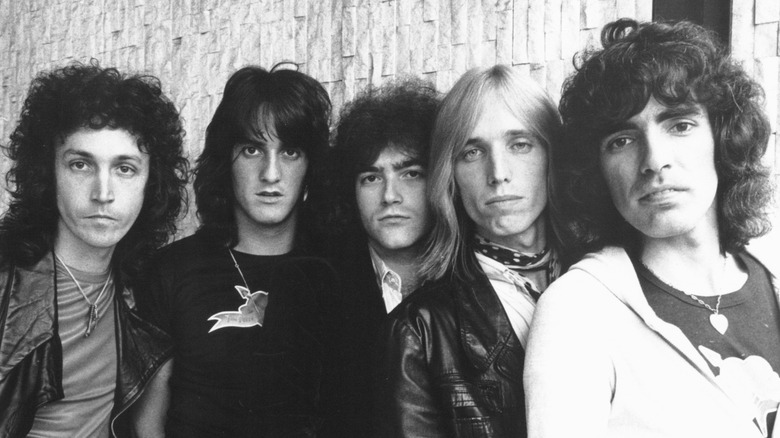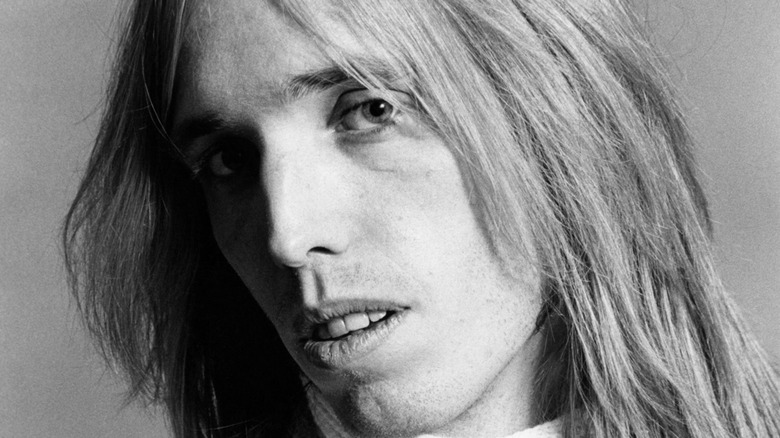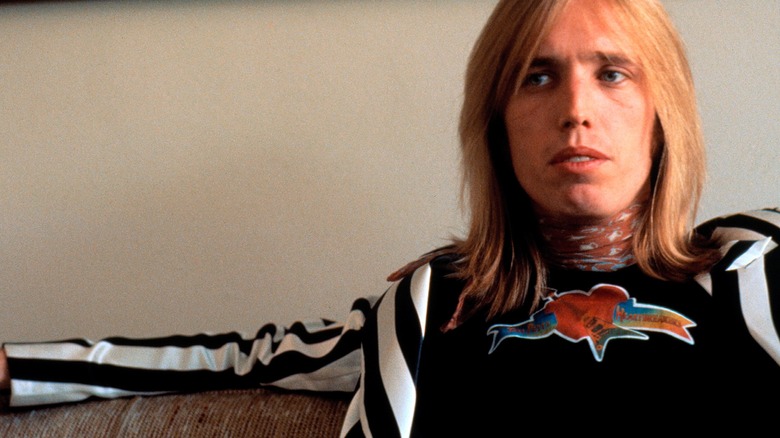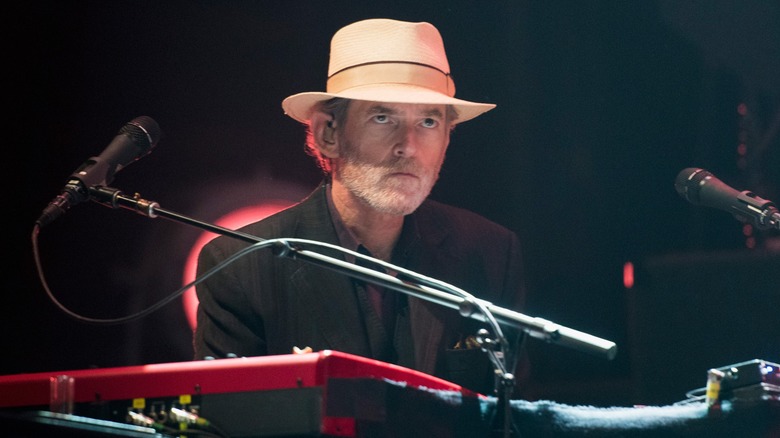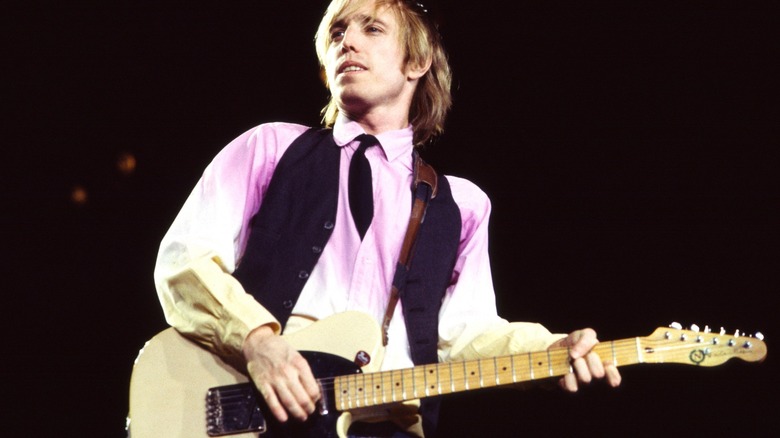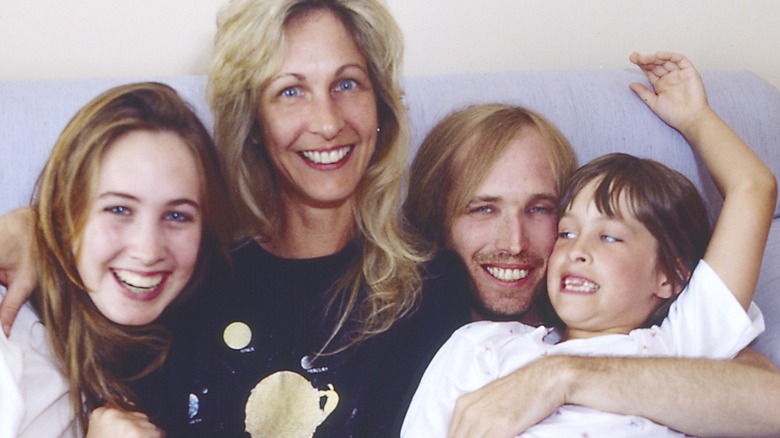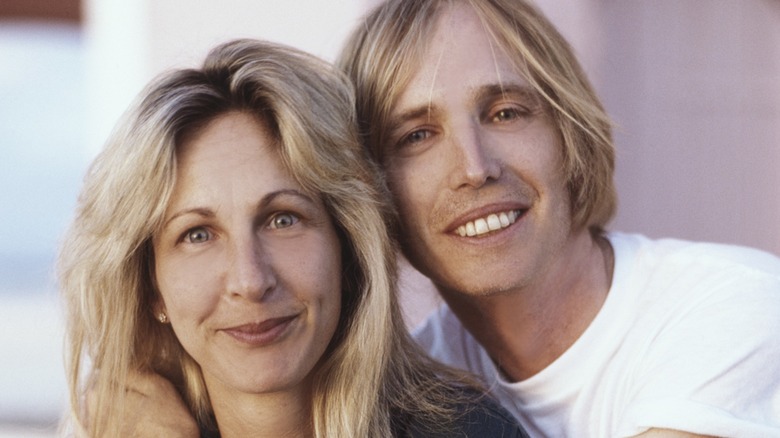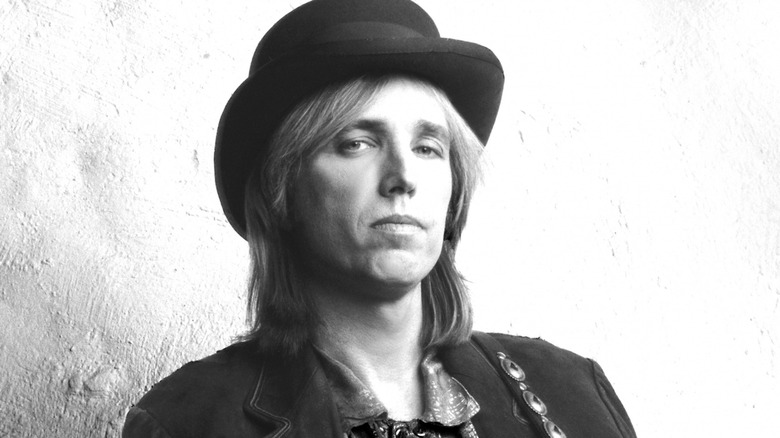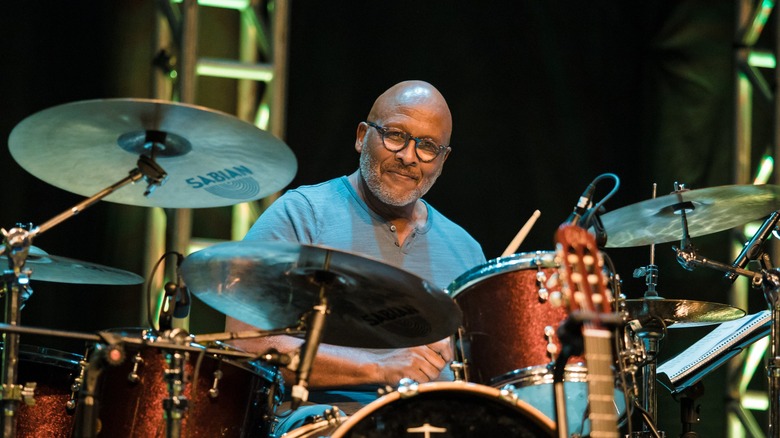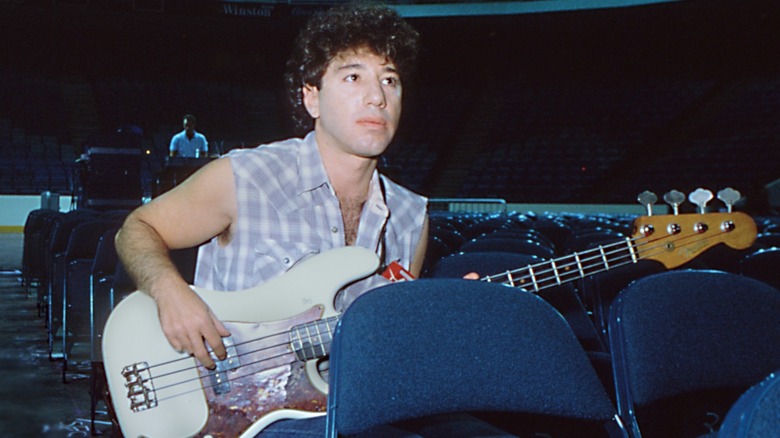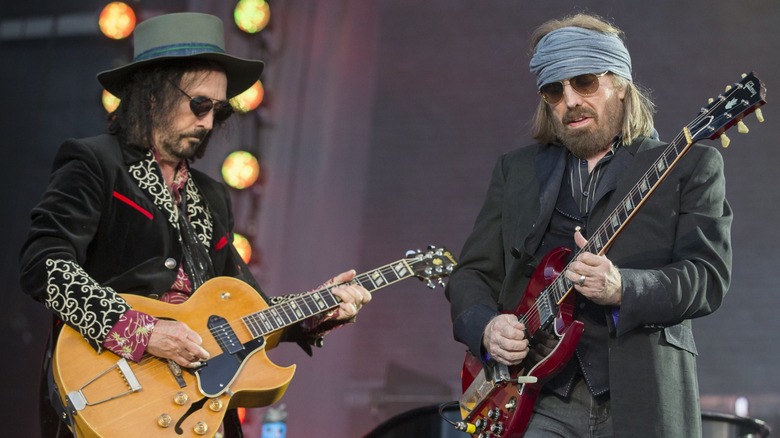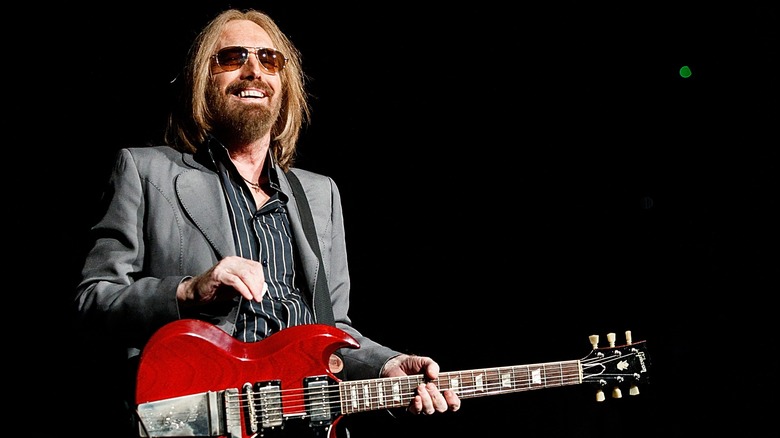Tragic Details About Tom Petty And The Heartbreakers
Fronted by the legendary vocalist, guitarist, and songwriter Tom Petty, Tom Petty and the Heartbreakers captured the lively and rebellious essence of American rock in a way that everyone could relate to. Petty and his equally talented bandmates, dubbed the Heartbreakers, came together in 1975 and soon caught the world's attention with enduring hits like "Breakdown," "Refugee," "American Girl," and "Mary Jane's Last Dance." But, as the band's frontman and primary songwriter, Petty often got the most attention – and all its affiliated stress.
Over the years he jammed with rock 'n' roll greats like Bob Dylan, George Harrison, and Stevie Nicks, wrote the now-iconic songs "Free Fallin'" and "I Won't Back Down" as a solo artist, and famously confronted the music industry's exploitative nature on several occasions. But what Petty loved most was being in a band and playing music, which had consistently provided a safe refuge throughout his tumultuous life. Unfortunately, as a natural leader, he also found himself forced to make all the difficult decisions – and sacrifices – that came with running a successful band for over four decades.
This came at a great price to him and would eventually even cost him his life. Behind his defiant smirk, the seemingly carefree Petty was troubled by inner turmoil and domestic trauma. Privately, he suffered abuse, depression, a secret drug addiction, and repeated loss. He dealt with plenty of hardships over the years – as did many of his bandmates. Here are some tragic details about Tom Petty and the Heartbreakers.
The following article includes allegations and descriptions of domestic abuse, child abuse, addiction, suicide, and mental health issues.
Tom Petty had an abusive father
Tom Petty grew up in the relatively small town of Gainesville, Florida, in the 1950s and early '60s. Tragically, his dad, Earl Petty, was a violent alcoholic who often took his anger out on his eldest son. Starting when he was around five years old, Tom experienced repeated physical abuse at the hand of his father. The first time it happened was after he had fired his slingshot at a passing car, angering both the driver and Earl.
"When my father got home later, he came in, took a belt, and beat the living s*** out of me," Tom told Warren Zanes in his book "Petty: The Biography." "He beat me so bad that I was covered in raised welts, from my head to my toes. I mean, you can't imagine someone hitting a child like that. Five years old. I remember it so well. My mother and my grandmother laid me in my bed, stripped me, and they took cotton and alcohol, cleaning these big welts all over my body."
In junior high, he ran away and briefly lived with his grandmother. But Earl came and got him, subjecting him to further abuse. Still, Tom claims that his traumatic childhood likely led to his later success as music helped him cope. "It's always been my sanctuary," he told Paul Zollo in his biography "Conversations with Tom Petty." "I withdrew into music. I went into that world. And it was this nice, safe, wonderful world."
Tom Petty regretted how he handled his mother's death
Tom Petty was close with his mother, Katherine "Kitty" Petty. As someone who nurtured him and understood what it was like to be abused by Earl Petty, Kitty was a source of love in young Tom's life. She also introduced him to music. "She tried to keep an element of civilization in the house," Tom explained to Men's Journal in 2015. "She had a record player and would play Nat King Cole and the West Side Story soundtrack. I think of her every time I hear those songs."
Unfortunately, Kitty was beset with health problems around the time Tom's star was rising in the mid-1970s, having both epilepsy and cancer. Tom visited when he could, though he had moved to Los Angeles and was admittedly more focused on his music career than his ailing mother. It was something he would later regret, as Kitty died in 1980.
By then, Tom was so famous that he decided not to attend her funeral for fear that his presence would be a distraction. This decision, too, haunted him. "It's one of my great regrets and it's really sad, that I could have done so much for her," Tom told Paul Zollo in his biography "Conversations with Tom Petty." "And she died. It was devastating." Tom later paid tribute to his mother in his band's heartfelt 1985 ballad "Southern Accents," which features lyrics about her visiting him in a recurring dream.
Keyboardist Benmont Tench battled substance abuse
Keyboardist Benmont Tench joined the Heartbreakers in 1975 after Mudcrutch – a band he had played in alongside both Tom Petty and guitarist Mike Campbell – disbanded. In fact, it was Tench who technically assembled the Heartbreakers, rallying Gainesville, Florida's finest musicians into a band capable of backing him in the studio so he could hopefully secure his own record deal. When Petty – who already had a deal – came along to a session, he suggested joining forces, and, thus, Tom Petty and the Heartbreakers was born.
As Petty recalled in Paul Zollo's biography "Conversations with Tom Petty," he first met Tench at a music shop in Gainesville after witnessing him play an entire Beatles album on the organ. Petty was immediately blown away by his abilities, though Tench was only around 13 years old at the time. "He's an incredible musician," Petty told Zollo. "I've never ever encountered a musician any better, and very few on his level."
Unfortunately, the band's success came with hard work and loneliness. It took a toll on Tench, who started heavily using drugs and alcohol in an attempt to both cope with anxiety and depression and gain creativity and inspiration for songwriting. "The problem was that it ended up taking that away from me and slamming that door shut," Tench explained on the "Coffee with Alice" podcast in 2014. "My life had become miserable ... I couldn't even look at my face in the mirror." Luckily, he eventually managed to get sober.
Tom Petty suffered from severe anxiety before shows
Looking at Tom Petty's trademark album cover smirk or listening to his wry interviews, you might assume he was the most easygoing, confident guy on the planet. But you'd be wrong. Truthfully, he was notoriously introverted, though many mistook this for arrogance. Petty told Warren Zanes in his book "Petty: The Biography" that throughout his career, he suffered from severe stage fright before shows that sometimes caused stomach pains and impaired his vocal abilities.
As a result, he limited his interactions with the press – and almost everybody else – before performances. He also stopped doing soundchecks. "I'm kind of delicate mentally," he admitted to Zanes. In Paul Zollo's biography "Conversations with Tom Petty," he joked that his kids laugh about the public's misconception of him. "They said 'The world pictures you as this laid-back, laconic kind of person, and actually you're the most intense, neurotic person we've ever met.'"
Petty told Zollo that developing a plan helped him manage his performance anxiety and bring spontaneity and enjoyment back to his shows. After seeking a racecar driver's advice, he developed a ritual of showering, drinking tea, doing vocal warm-ups, and diligently reviewing the setlist before taking the stage. Still, performing was always a taxing experience. "You kind of spend the whole day gearing up for it, and the night getting over it," he told NPR in 2014. "You just want to be as wonderful as everyone thinks you are, and you know you're not."
An unknown arsonist burned down Tom Petty's house
On May 17, 1987, a still-unknown person intentionally set fire to Tom Petty's house in Encino, California. Even worse? Petty, his then-wife, and one of his daughters were inside when it happened. As Petty explained to Paul Zollo in his biography "Conversations with Tom Petty," the mysterious arsonist had been watching the family's home for a while. Then, one morning, they lit a can of lighter fluid and torched the wooden house.
The inferno started dangerously close to one of his daughter's bedrooms. After smelling smoke, he managed to get his wife and daughter out just in time, directing them to jump into the swimming pool. Then he made his way through billowing black smoke to the back door, where he attempted to extinguish the flames before the hose melted in his hands. His housekeeper, trying to do the same, caught fire and had to douse herself with the hose.
"It was such a shock," Petty told Zollo. "To have somebody try to kill you is a really bad feeling. And I never really wanted to talk about it in detail, because it frightened me so bad. I wouldn't even use the word 'fire' in a song or anything. It really frightened me. They didn't just try to kill me, they tried to wipe out my whole family." The destructive fire resulted in $1 million in damages, caused everyone psychological distress, and inspired Petty's 1989 hit song "I Won't Back Down."
Tom Petty's tumultuous and abusive marriage ended in divorce
Tom Petty married his girlfriend, Jane Benyo, right before leaving for Los Angeles to pursue his music career in 1974. As he explained to Warren Zanes in "Petty: The Biography," he had some reservations but was pressured into it by his mother, grandmother, and Jane, whom he deeply loved. Their daughter, Adria, was born later that year – long before he made it big. After Tom's career took off, the couple had a second daughter, Annakim, in 1982. But then the marriage began to crumble.
Though success was always part of their plan, Jane often found herself left alone with the kids while Tom toured. On top of that, she suffered from mental illness and began abusing drugs and alcohol. On one occasion, Tom found her passed out on the floor while Adria was asleep in the other room. He blamed himself for everything that happened, but, by 1984, he knew he had to leave – a feeling he captured on his 1994 solo album "Wildflowers."
Though the several-year divorce was finalized in 1996, Jane would still regularly call Tom and threaten suicide if he hung up. She was also arrested for yelling outside his house at night. "Being married to someone who is mentally ill for a long time is really painful," Adria explained to Zanes. "My mom could be a mean person. She'd been really verbally abusive and cruel to my dad ... I just hated watching what she did to him."
Fame further strained Tom Petty's relationship with his family
Though becoming a successful musician was always Tom Petty's ultimate goal, his newfound fame came with some dark and unexpected side effects. In Warren Zanes' book, "Petty: The Biography," Petty recalled a time when he returned to Florida to visit his dying mother in the hospital, only to find that a nurse had covered her inert body with magazine and newspaper clippings of him. "I thought, "Even this moment, even this someone had to corrupt with some reaction to fame," he told Zanes.
On that same trip, his father asked him for money, and, later, family members he barely knew suddenly wanted autographs from him. As he explained in Paul Zollo's biography "Conversations with Tom Petty," his father also assumed the role of "Tom Petty's Dad," which brought him his own sort of fame and led him to exploit his son's celebrity status by giving interviews, inviting fans over for extended stays, and suckering Petty into impromptu meet and greets.
As a result of the ruckus his fame caused, Petty didn't attend his mother's funeral – something he regretted. And when he later attended his father's funeral in 1999, his aunt asked him for autographs while at the event, which deeply disturbed him. "I mean, I'm walking away from my dad's coffin," he explained to Zanes. "It's a hundred feet away from us, right? I'm thinking, 'He's your brother, for Christ's sake, and you're looking for autographs at his funeral?'"
Drummer Steve Ferrone struggled with personal demons
After founding drummer Stan Lynch was fired from Tom Petty and the Heartbreakers over long-standing differences in 1994, accomplished drummer Steve Ferrone – who had played with the likes of Chaka Khan, Duran Duran, and Eric Clapton – took his place. He started out as what the band's management called a "Sidebreaker," basically a paid on-call musician who wasn't quite an official member of the band.
He soon became a full-on Heartbreaker and remained one for over two decades – the rest of the band's career. Like many musicians, Ferrone was battling substance addictions when he first joined. But, luckily, the new gig coincided with his achieving sobriety – and he claims that Tom Petty was hugely supportive during that difficult process. Petty also helped Ferrone tackle another troubling issue: his identity.
"I was probably 47 when I found out that I didn't have my father's name," Ferrone told Rolling Stone in 2020. "It turned my legs to jelly. One of my foundational beliefs was ripped away from me. I was really upset." He explained that his surname was taken from a movie to protect him, as being illegitimate with a Black father in 1950 wasn't widely accepted. "Tom said to me, 'What was your father's real name?'" Ferrone explained to Rolling Stone. "I said, 'Nicholson.' He said, 'Nicholson? Steve Nicholson. Steve Nicholson on drums. That doesn't sound good. Steve Ferrone on drums, that sounds good. You did that. You made that name. That is your name.'"
Tom Petty privately battled depression and addiction
After divorcing his wife of 22 years in 1996, Tom Petty became clinically depressed in his 40s. "I probably spent a month not getting out of bed, just waking up and going, 'Oh, f***,'" he told Warren Zanes in his book "Petty: The Biography." He soon started dating Dana York (pictured), his longtime crush whom he would later marry. But, around the same time, Petty began misusing heroin as a form of self-medication, and soon found that he couldn't stop.
"You start losing your soul," he told Zanes of his addiction. "You realize one day, 'S***, I've lost myself.' ... I wanted to quit." Ashamed, he hid his addiction from everyone in his life, including Dana, for as long as he could. Still, Petty's colleagues described the recording sessions for what is arguably Tom Petty and the Heartbreakers' saddest album, 1999's "Echo," as dark, and recall Petty seeming distant and out of character, wearing sunglasses all the time and using a cane to walk.
Luckily, with the support of Dana, friends, and his therapist – who helped him process years of trauma – Petty quit heroin and began working through his issues. "My therapist said something to me that, in that moment, cut through all the clutter: 'People with your level of depression don't live. They kill themselves or someone else,'" he told Zanes. "Maybe that was when I realized that in fact I wasn't living, that I was heading in the other direction."
Bassist Howie Epstein died of an overdose
Bassist Howie Epstein joined Tom Petty and the Heartbreakers in 1982 after the band's original bassist, Ron Blair, left to pursue other interests. Epstein had a shy, boyish charm and meshed well with the other band members. He also had an incredible singing voice and provided dynamic vocal harmonies. Sadly, Epstein started misusing heroin during the recording of the band's 1985 album "Southern Accents."
By the time the group was recording 1999's "Echo," he was using it to such an extent that it altered his appearance and negatively impacted his life. He showed up late to practices, made uncharacteristic mistakes, and often missed band engagements. In Warren Zanes' book "Petty: The Biography," Petty explained that this is the reason he isn't pictured on the album's cover with the rest of the band. Following the difficult "Echo" tour, Petty tried to get Epstein to go to rehab.
Sadly, he refused to complete his treatment and Petty fired him in an attempt to wake him up. Not long after, he died of complications related to his addiction on February 23, 2003. He was just 47 years old. Of his bandmate's death, Petty wrote in Rolling Stone (via Ultimate Classic Rock): "It's like you got a tree dying in the backyard, and you're kind of used to the idea that it's dying. But you look out there one day and they cut it down. And you just can't imagine that beautiful tree isn't there anymore."
Tom Petty sacrificed his health for the band's 2017 tour
In 2016, just months before his band's planned 40th-anniversary tour kicked off, Tom Petty ominously told Rolling Stone: "I'd be lying if I didn't say I was thinking this might be the last big one." At the time, he was enduring tremendous pain from a fractured hip, but he insisted on postponing surgery and hitting the road as he felt that his band, crew, and fans relied on him.
"I remember talking to him and saying, 'Are you up to it?'" guitarist Mike Campbell told The Guardian in 2020. "And he said, 'I'm doing this tour if I have to sit in a chair. I'm not staying home.' It's like the sailor and the sea – you always want to be out there." Still, the six-month 2017 tour proved incredibly difficult – and dangerous – for him. As drummer Steve Ferrone explained to Rolling Stone, Petty relied heavily on the intense painkiller OxyContin, golf carts, and his bandmates to help him to and from the stage.
After the shows, he would rest in his hotel room, recovering for the next tour stop. "Despite this painful injury he insisted on keeping his commitment to his fans and he toured for 53 dates with a fractured hip and, as he did, it worsened to a more serious injury," Petty's family wrote in a statement (via CNN). This prolonged agony ultimately led to his increasingly heavy use of powerful pain medications, which would later prove deadly.
Tom Petty died of an accidental overdose
Just days after the final Tom Petty and the Heartbreakers tour concluded in Los Angeles, Tom Petty was found unconscious in his home after suffering cardiac arrest. He was rushed to the hospital, but efforts to revive him failed and he died at age 66 on October 2, 2017. His death was ruled an accidental overdose of several anxiety, depression, and pain medications that he was taking for emphysema, knee problems, and a fractured hip.
In a statement (via NPR), Petty's family revealed that his fully-broken hip was his main source of pain. In fact, his wife, Dana, told the Los Angeles Times that if he'd done the hip surgery instead of the tour, he'd still be alive. "The day before he died, he was pounding on his chest going, 'I'm on top of the world!'" Dana told Billboard in 2018. "Never had he been so proud of himself, so happy, so looking forward to the future – and then he's gone."
For the Heartbreakers, Petty's death leaves an unfillable void. As drummer Steve Ferrone told Rolling Stone in 2020, the band's long tenure essentially ended with its leader's unexpected death. "I will probably be grieving Tom for the rest of my life," guitarist Mike Campbell told The Guardian in 2020. "We were best friends. We were poor kids who had a dream to play music and maybe make a record someday, and all of those dreams came true for us, together. That's huge."
If you or anyone you know needs help with addiction issues, mental health issues, may be the victim of child or domestic abuse, or is experiencing suicidal thoughts, contact the relevant resources below:
- The Substance Abuse and Mental Health Services Administration website or contact SAMHSA's National Helpline at 1-800-662-HELP (4357).
- The National Domestic Violence Hotline at 1−800−799−7233. You can also find more information, resources, and support at their website.
- The Childhelp National Child Abuse Hotline at 1-800-4-A-Child (1-800-422-4453) or contact their live chat services.
- If you or someone you know is struggling or in crisis, help is available. Call or text 988 or chat 988lifeline.org
